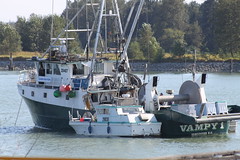 Image by Suraky via FlickrBy Anthony Ricigliano
Image by Suraky via FlickrBy Anthony RiciglianoFor centuries fishing has provided food for the world's communities. As with many of the world's most precious natural resources, sustainability is becoming a huge issue for the fishing industry. In short, commercial companies are overfishing the world's oceans, bringing entire fish populations to the brink of danger.
Researchers predict that if current fishing trends continue at their established rates, wild marine species will experience a total collapse by the year 2050. Four short decades from now, countries that depend upon fishing to feed their populations will run into a major issue unless something is done to slow the harvesting of wild fish.
The truly alarming fact is that fishing numbers are trending in the wrong direction. Each year, more and more wild fish are being harvested, often times at the expense of long-term sustainability. Though this fact is certainly frightening, it is not too late to reverse the trend. Something can be done to restore the vitality of fish populations through the world's most precious waters, but the time to act has arrived. What can be done to help preserve fish populations and even help them grow to previous population numbers? A system of institutional control would be a great place to start.
Given the nature of international law and the fact that the majority of fishing happens in open waters, there exists some regulation difficulty. A study conducted by the University of British Columbia and the WWF found that 23 rogue countries were responsible for 40% of the world's catch. Those countries were, at least to some extent, ignoring the important international fishing laws put forward by the United Nations. Taking advantage of the lack of a regulating body, these countries and their fishing industries have exploited international waters, robbing them of large fish populations.
Those same researchers have been trying their hardest to come up with workable solutions for this growing problem. Among the major issues standing in the way of future fish populations is the voluntary nature of the international fishing code. Though put forth and agreed to by members of the international community, the code comes with no true prohibitive backbone. Countries are only asked to comply with the regulations put forth, so it is not surprising that many of them look past certain parts of the agreement. A separate study found that no nation complies with more than 60% of the code, while many nations overlook as much as 90%.
In order to remedy this gloomy situation, a new global initiative must take place. Consequences must be put into place, providing ample reason for countries to abide by the rules. The preservation of fish populations is something that remains in the best interest of all nations. A cooperative international law must be put into place, and the United Nations must oversee its enforcement. Economic sanctions are swift and they act as excellent deterrents for countries that might think of violating a mandatory code. Additionally, changing the perception of international fishing laws will help to stop this debilitating global trend.
Strict limits on the number of fish that can be harvested is the first step in stopping both commercial and recreational exploitation. Likewise, measures must be taken to stop the harvesting of fish populations that are in special danger. By taking these fish out of the equation for commercial fishing companies, an entire population might be preserved for the future. A change in tone and culture is necessary, as the United Nations must make it clear to countries that international over fishing is a major problem for the future. If global waters are to be preserved, this brave undertaking will be the first step.
About Anthony Ricigliano: With 25 years of integrating the latest technological advances into business operations, Mr. Anthony Ricigliano is a point man capable of establishing and managing state of the art infrastructure to maximize operational efficiencies.
Article Source: http://EzineArticles.com/?expert=Anthony_Ricigliano
http://EzineArticles.com/?Over-Fishing-the-Worlds-Oceans&id=4747760

No comments:
Post a Comment